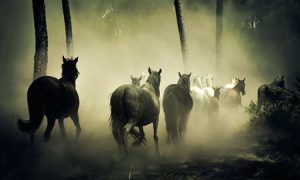
What do you think the end of the world will be like? Mountains being rent in twain and spilling forth millions of Piers Morgan clones? The sun turning black to the sound of Bill Withers holding that note from Lovely Day for all eternity? Liverpool winning the league? Makes you shudder just thinking about it.
It’s not every day that you learn something interesting on LinkedIn, as my LinkedIn audience will testify, but a couple of weeks ago I was catching up with my first cousin once removed – which is where LinkedIn does come in useful – when he stunned me with some new information. Just as we were ending our exchange, he made an allusion to words that mean virtually the opposite to what they originally meant and casually dropped in, “Like apocalypse”.
Talk about Earth-shattering revelations! I knew about words like terrific, which originally meant something akin to terrifying, and tremendous, which meant something so bad it made you tremble, but apocalypse? I had to investigate.
For a planet that’s obsessed with its own destruction, I suppose it’s no surprise that we have a number of words for the end of the world. Armageddon, cataclysm, Brexit… most of them pretty long, as if invented in the hope of buying a bit more time. These words have all come to mean a world-ending event but that wasn’t their original intention. (Well, that’s what Nigel Farage would have us believe anyway.)
The same is true of apocalypse. For the Greeks, who invented the word, it suggested vision and insight – a revelation. In those days, revelations were good things, useful things. This was before Max Clifford. The fact that the revelation presented to John, according to the climactic last book of the New Testament, happened to be one of plague, pestilence, death and global destruction seems to have skewed the meaning of apocalypse somewhat.
If, like me, your brother bought All Mod Cons by The Jam in 1978 and you played it repeatedly with your headphones on while wearing drainpipes and white socks and whacking biscuit tins with wooden spoons while memorising the lyrics, you’ll be familiar with the song A-Bomb in Wardour Street, at the end of which Paul Weller spells out A-P-O-C-A-L-Y-P-S-E in a sort of post-punk echo of Ottawan’s D-I-S-C-O. This was my first encounter with the word. The thing is, ‘disco’ is an easy word to spell. I had to get a pencil and paper to scribble down what Weller was talking about and then find a dictionary before I could derive full enjoyment from the song.
But it stuck. And that’s how I learnt what apocalypse means. Or at least, what it means now. Of course, once I’d learnt it I never forgot it and I cleaned up at a number of spelling bees… until the time I got The Jam mixed up with Tammy Wynette and spelt out D-I-V-O-R-C-E by mistake.
So what’s your vision of the apocalypse? Tell us your answers quick and we’ll see who’s right at the end of the month.


